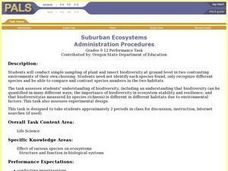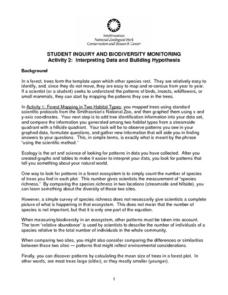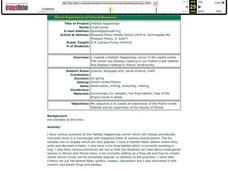Curated OER
Summer: Getting the Bugs Out
Students study biodiversity while examining insects. They research insects that already exist and how they adapt to their environment.
Curated OER
BioKeys
Students identify insect (and plant) specimens using the online resource Biokeys. They record the data that they collect in their notebooks. Students use identification characteristics and features that are shared and unique among groups.
Curated OER
Biodiversity
In this biodiversity learning exercise, students sort and classify animals by their observable features using a dichotomous key. Students then respond to questions about complete and incomplete metamorphosis.
Curated OER
Aquatic Insects: Water Quality Index & Diversity Index
Students search stream beds to study the life cycle and adaptations of stream insects. They explore creeks and streams to see the diversity index of creeks or streams and to find the water qualit index.
Curated OER
Prairie Restoration and Prairie Ecology
Students collect data as they identify and classify native prairie plants and insects. They create their own population study using a variety of sampling techniques to determine the population density of various species. Students...
Curated OER
Relating Number of Insect Species to Water Quality
Students are asked to respond to questions such as:" Have there been surveys of the area to inventory the species?" (For example, for a wetland area, do they know what amphibians live there and how abundant they are?) Are there any...
Curated OER
Suburban Ecosystems
Learners conduct simple sampling of plant and insect biodiversity at ground level in two contrasting environments of their own choosing. They recognize and record different species then compare and contrast species numbers in the two...
Curated OER
Interpreting Data and Building Hypothesis
Young scholars define the term species, and graph species data together with previously collected data at the National Zoo. They interpret graphed data and recognize patterns in the streamside quadrant versus hillside quadrant. Students...
Curated OER
Parasite Development and Life Cycle
If you are new to teaching agriculture classes, this outline may be helpful when you are preparing a lecture on parasites in livestock. In addition to lecturing on this topic, the lesson plan suggests that learners research the life...
American Museum of Natural History
What's This? Staying Safe
Amaze the class with the creative adaptations species employ to trick predators. An online interactive lesson introduces learners to six different species with unique adaptations. Each species highlights a different adaptation and its...
Curated OER
Pets: Oh Behave
They say that a dog is a man's best friend. Why is that? Discuss with your class why people like pets and the responsibilities with owning one. They read an article about pet behavior and write a short essay comparing one of their...
Curated OER
Pyramid of Biomass
Students interpret data to demonstrate biomass and number pyramids. They use information to draw conclusions and examine an example of biological magnification.
Curated OER
Investigating comparative biodiversity of wetland and schoolyard sites
Fourth graders participate in an activity dealing with the environment.
Curated OER
Biodiversity in Illinois-Pond Habitats
Second graders construct a pond habitat in the classroom using a small swimming pool partially filled with water, real cattails, a tree log adjoining, and plastic animal life appropriate to a pond setting. They examine the frog in detail...
Curated OER
Who's the Baddest?
Learners are introduced to the realm of social insects, their role in the environment and the biological features that make them unique.
Curated OER
Discover a Pond Food Web
Students study the biodiversity of animal life in a pond. They investigate the interdependence between pond organisms by completing a pond dipping activity and completing a checklist.
Curated OER
Biodiversity: El Imposible National Park, El Salvador
Fifth graders explore the concept of how the more diverse an ecosystem is, the more interdependence of species exists within that system. The complex relationships among diverse species are difficult to identify. As species disappear or...
Curated OER
Wacky Water Critters
Students recognize the biodiversity that exists in a wetland ecosystem. They identify individual wetland organisms. Students define, identify, and comprehend the importance of adaptations. They describe the process of metamorphosis.
Curated OER
Rainforest Complexity and Diversity
Second graders investigate the diversity of plants and animals in a rainforest. They watch an online story developed by the Rainforest Alliance, observe and record animals in their local area, explore various websites, and compare and...
Kenan Fellows
Use of Dichotomous Keys to Identify Stream Organisms
What kind of organisms are living in the stream? After an explanation on how to use a dichotomous key, groups of three to four use the keys to identify macroinvertebrates from a local freshwater stream. Using the the concept of Stream...
Teach Engineering
Bees: The Invaluable Master Pollinators
There is nothing in the world quite like a bee. Here is a video that explains the importance of bees to pollination. Scholars consider possible solutions to the declining population of bees in the ninth and final installment in the series.
ARKive
Butterflies and Blooms
The Northwoods of Wisconsin are lovely in the summer,and they are also home to many flower and butterfly species. Investigate the ways in which seasonal flowers and butterflies are interdependent on each other for survival with a fun...
Curated OER
Habitat Happenings
Students examine the characteristics of the Prairie Creek Habitat in Illinois. In groups, they travel between various stations writing haikus and reading brochures. They identify what occurs in each habitat and identify the animals...
Curated OER
Protecting Philippine Reefs
Students watch a slide show about the Philippine Reefs to explore the topic of fish populations. In this reef and fish population lesson, students watch a slide show about fish populations and how the Peace Corps works with Filipinos to...

























